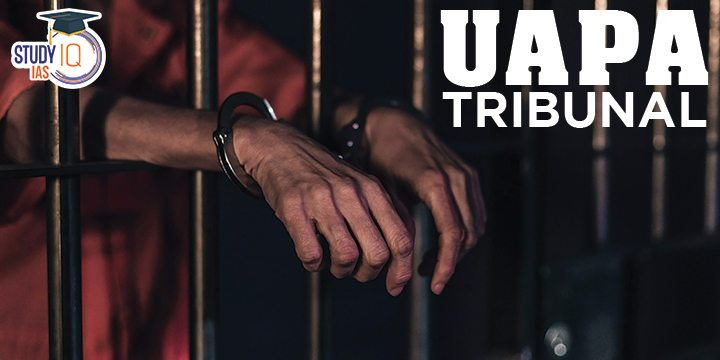Table of Contents
UAPA Act : More on the News
- The central government declared the Popular Front of India (PFI) as unlawful under the UAPA Act or the Unlawful Activities (Prevention) Act. Hence PFI and its eight other affiliate organisations were banned.
- Generally, an organisation is declared unlawful and the declaration is referred to a tribunal for adjudication. But, the Central government can, if it deems fit, pass an order declaring an organisation illegal under UAPA Act as well.
- The declaration of an outfit as unlawful can be done in two ways under the UAPA Act :
- Section 3 of the UAPA: The first method is by declaring the organisation “unlawful” via an official notification in The Gazette of India, under section 3 of the UAPA Act .
- Section 35 of the UAPA Act : The second method is by amending the UAPA Act and adding the organization to a list of 42 terrorist organizations, under section 35 of the UAPA Act .
- The PFI ban came under the first method, i.e. under Section 3 of the UAPA Act, with the Ministry of Home Affairs issuing a notification declaring PFI unlawful.
- Significance of Sections under the UAPA: The provisions used to declare an organisation “unlawful” under the UAPA Act matters because these provisions determine the scope of punishment, bail rights, and other penalties that can be levied on the outfit.
- Section 35 of the UAPA : Until now, the PFI hasn’t been added to the list under the same classification of terror outfits as the Lashkar-e-Taiba, and the Khalistan Liberation Force, under Section 35 of the act.
| Factors | Provisions |
| What Actions Can The Government Take Against PFI? |
|
| Punishments and Penalties that PFI Members can Face under UAPA Act |
|
What is a UAPA Act tribunal?
- The UAPA Act provides for a tribunal under a High Court judge to be constituted by the government for its bans to have long-term legal sanctity.
- Relevance: A government order can come into effect only after the tribunal confirms it.
- However, under exceptional circumstances, the notification can come into effect immediately once the reasons for it are recording in writing. The tribunal can endorse or reject it.
- Procedure for Tribunal Confirmation: As per the Section 4 of the UAPA Act, after the Central government declares an organisation “unlawful”, the notification of this declaration must reach the tribunal within 30 days to the Tribunal. Then, the tribunal shall adjudicate whether or not there is sufficient cause for the move.
- Then, the tribunal calls upon the association declared as unlawful, by notice in writing, to show cause within 30 days why it should not be declared unlawful. Once this is done, the tribunal holds an inquiry and decides the matter within six months.
- Constitution of the tribunal: The tribunal consists of only one person and this person has to be a High Court judge. If a vacancy occurs in the Tribunal, the Central government appoints another judge. The proceedings of the Tribunal continue from the stage at which the vacancy is filled.
- The Centre is required to provide to the tribunal such staff as necessary for the discharge of its functions. All expenses incurred for a tribunal are borne out of the Consolidated Fund of India.
- Powers of the Tribunal: The tribunal has power to regulate its own procedure, including the place at which it holds its sittings. Thus, the tribunal can hold hearings in different states for allegations pertaining to those states. All proceeding before the Tribunal are deemed to be judicial proceedings.
- In case of making inquiries, the tribunal has the same powers as vested in a civil court under the Code of Civil Procedure, 1908.
- These powers can be exercised in summoning a witness and examining him on oath; production of any document or other material object producible as evidence; the reception of evidence on affidavits; the requisitioning of any public record from any court or office; and the issuing of any commission for the examination of witnesses.
- Past Performance of the Tribunal: Proceedings of the tribunal have been criticised for being opaque to some extent.
- The UAPA Act permits public non-disclosure of information on bans given the sensitivity involved. But there has been criticism that the government gives evidence in sealed cover, leaving no opportunity for an organisation to defend itself.


 Serious Fraud Investigation Office (SFIO...
Serious Fraud Investigation Office (SFIO...
 Article 142 of Indian Constitution, Sign...
Article 142 of Indian Constitution, Sign...
 Pakistan-Occupied Kashmir (PoK): History...
Pakistan-Occupied Kashmir (PoK): History...





















